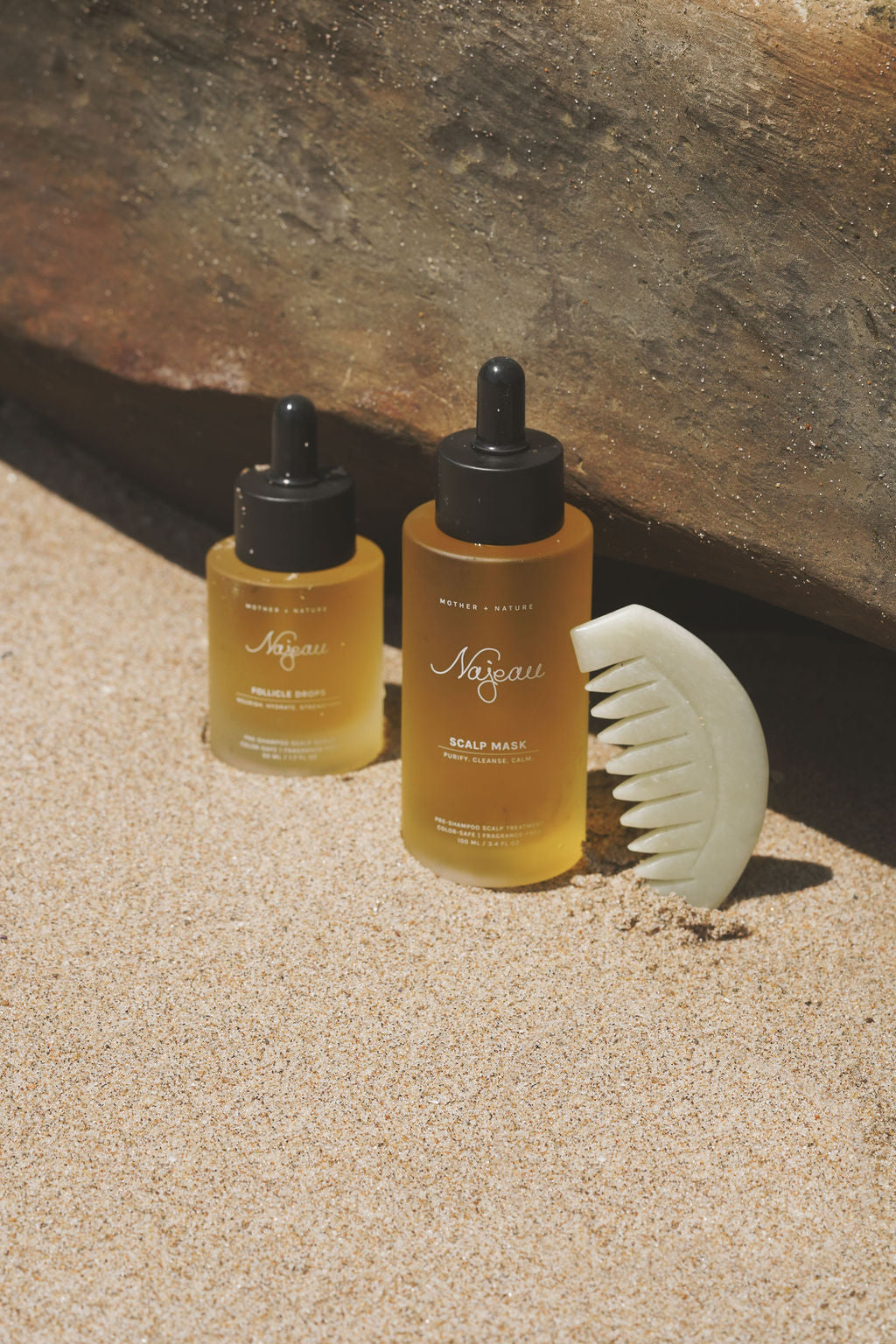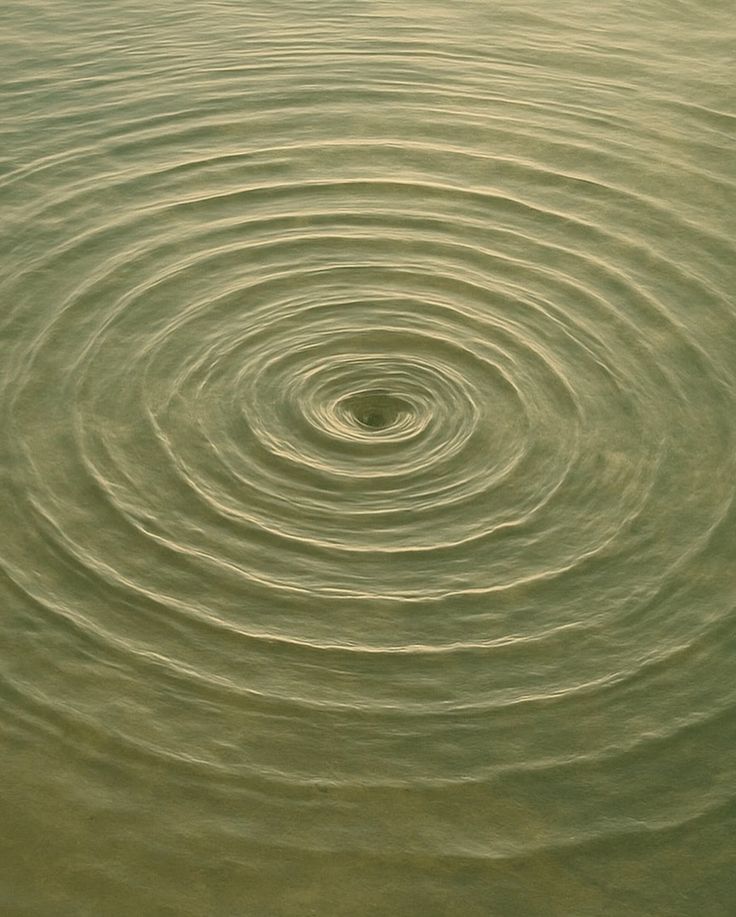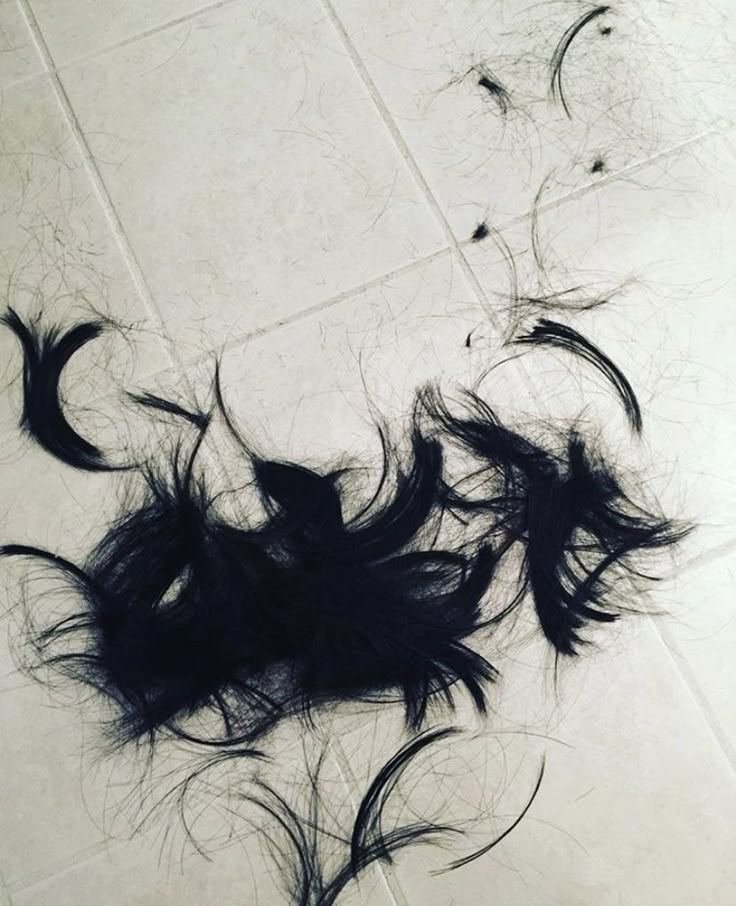The scalp requires the same proper care as the skin.
Shampooing alone does not cleanse deep enough to rid the scalp of build up from styling products, sebum, pollution and sweat. Overtime, this build up can clog hair tollicles causing irritation and may eventually lead to hair loss. It is critical to detoxity the scalp and remove impurities for overall hair health.
Just like your face, your scalp needs some TLC too. Regular exfoliation and moisturizing treatments are key to maintaining a healthy scalp and promoting hair growth. In this guide, we'll explain the difference between exfoliating and hydrating scalp treatments and why using both is crucial for optimal hair health.
Why is Scalp Exfoliation Important?
Over time, everyday buildup from product residue, oil, dead skin cells, and grime can accumulate on your scalp, clogging your hair follicles and stifling your hair. Here’s where scalp exfoliation comes in.
Removes Dead Skin Cells
Just like the skin on the rest of your body, your scalp sheds dead skin cells. Exfoliating helps to remove these cells, preventing buildup that can lead to issues.
Reduces Oil and Product Buildup
Hair products, oils, and sweat can accumulate on your scalp. An exfoliating serum can help cleanse these substances, keeping your scalp clean and healthy.
Supports Healthy Hair Growth
By removing dead skin and buildup, exfoliating serums can unclog hair follicles. This is essential for healthy hair growth and can prevent hair thinning and loss.
Improves Scalp Health
Regular exfoliation can help in balancing the natural oils on the scalp, reducing issues like dryness or excessive oiliness. A healthy scalp is the foundation for healthy hair.
Enhances Product Absorption
Exfoliation can increase the effectiveness of other hair care products by ensuring better absorption. Without the barrier of dead skin and buildup, nourishing products can penetrate more deeply.
Relieves Itching and Irritation
By removing irritants and soothing the scalp, exfoliating serums can reduce itching and discomfort.
Regular scalp exfoliation is recommended if you want to free up follicles and create a healthy environment for your hair to grow. Exfoliation can also boost blood circulation to your scalp and follicles, which can further encourage hair growth.
How to Exfoliate Your Scalp
One thing to know is that there’s a difference between physical exfoliation (scrubs) and chemical exfoliation, which helps loosen and unglue the bonds of dead skin cells. Be careful with physical exfoliants, as harsh abrasive scrubs can potentially cause microtears and damage your skin’s moisture barrier.
The Najeau Scalp Mask is an exfoliating scalp facial that contains tea tree oil as an active ingredient. A natural botanical exfoliant, tea tree oil helps clear oil buildup, unclogging follicles to promote healthy hair growth. If you have an itchy scalp, you’ll also enjoy the soothing burdock root and anise oils in this facial.
Just like with your skincare routine, it’s a good idea to exfoliate about once or twice a week. No need to overdo it, since daily exfoliation could actually disrupt your scalp’s natural skin shedding process and create an imbalance.
Why is Scalp Hydration/Moisture Important?
Now that we’ve already covered the difference between hydration and moisture in a previous post, we know it’s important to introduce both hydrating humectants and moisturizing occlusives to your scalp. Essentially, humectant ingredients pull water into your skin, while occlusive ingredients lock this moisture in.
When your scalp’s thirsty, this can trigger an overproduction of sebum. If you have a flaky, dry, or oily scalp, adding healthy fats to your ritual can be important for helping protect your skin’s vulnerable barrier for better balance overall.
Using a scalp serum specifically formulated for hydration, pH balance, and supporting the scalp's microbiome is crucial for several reasons:
Hydration
Just like skin, the scalp can become dry and irritated without proper hydration. A scalp serum designed for hydration can help maintain moisture levels, preventing dryness, flakiness, and itchiness.
pH Balance
The scalp's pH level is typically slightly acidic, around 4.5 to 5.5. This acidity helps to keep the cuticle of the hair closed and healthy. When the pH balance is disrupted, it can lead to problems like flakiness, oiliness, or scalp sensitivity. A pH-balanced serum helps to maintain this delicate balance.
Microbiome Health
The scalp has its own microbiome, a delicate balance of various microorganisms, including bacteria and fungi. Maintaining the health of this microbiome is crucial for preventing issues like dandruff, scalp acne, and odor. A scalp serum can support the microbiome, promoting a healthy environment for hair growth and scalp health.
Prevents Scalp Conditions:
By maintaining hydration, pH balance, and microbiome health, a good scalp serum can prevent various scalp conditions like seborrheic dermatitis, psoriasis, and eczema.
Enhances Overall Hair Health
A healthy scalp is the foundation for healthy hair. By ensuring that the scalp is well-hydrated, pH-balanced, and its microbiome is healthy, you're also promoting stronger, healthier hair growth.
Soothes and Protects the Scalp
Many scalp serums also contain ingredients that soothe irritation and protect the scalp from environmental stressors, further promoting scalp and hair health.
When choosing a scalp serum, it's important to select one that's suited for your specific scalp needs and hair type, and to use it as directed.
How to Moisturize Your Scalp
Najeau Follicle Drops feature hydrating aloe vera with healthy fats from liquid gold evoo, castor oil, vitamin e, sweet basil oil, and neem oil for a moisturizing scalp facial in a bottle. Use this pre-shampoo treatment 2-3 times a week, sectioning hair and gently massaging in the drops.
To recap, scalp exfoliation and moisturization are both important if you want a balanced scalp free of flakiness, itching, and other issues. Unclogging your follicles can contribute to freer hair growth, while hydrating ingredients and healthy fats can help pull in and lock in moisture to keep your scalp balanced.



